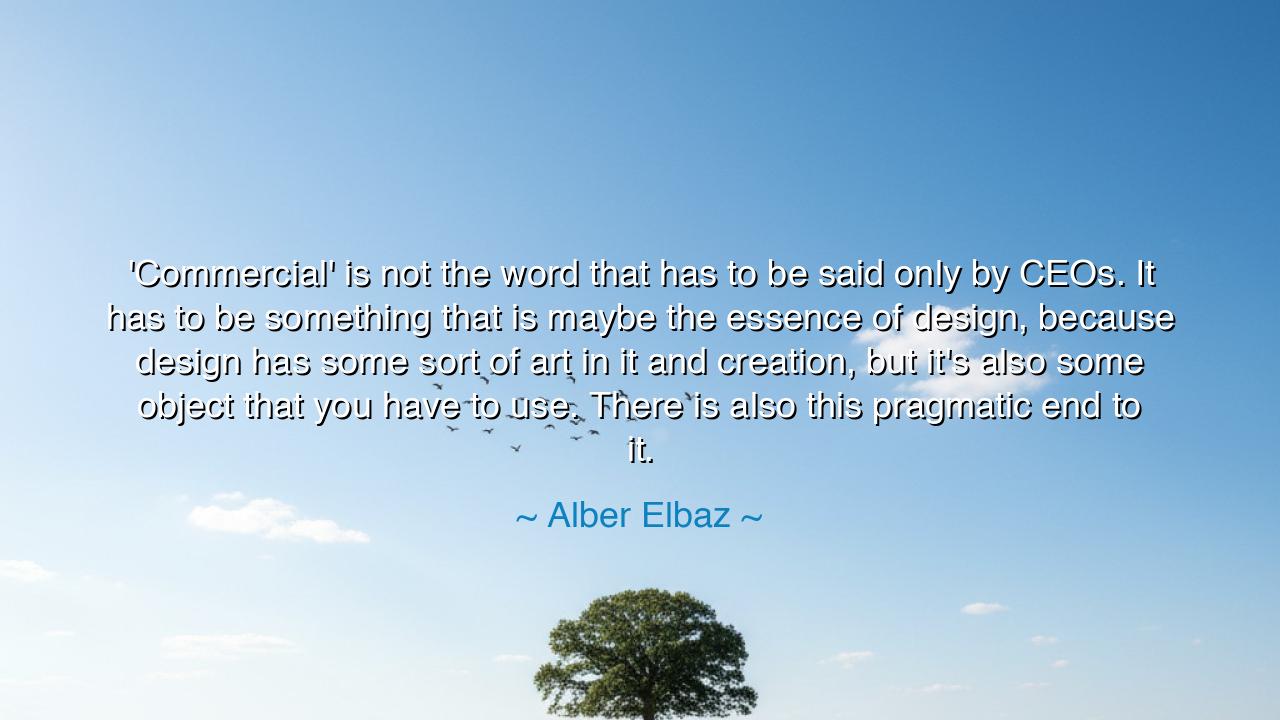
'Commercial' is not the word that has to be said only by CEOs. It
'Commercial' is not the word that has to be said only by CEOs. It has to be something that is maybe the essence of design, because design has some sort of art in it and creation, but it's also some object that you have to use. There is also this pragmatic end to it.






The visionary Alber Elbaz once said: “‘Commercial’ is not the word that has to be said only by CEOs. It has to be something that is maybe the essence of design, because design has some sort of art in it and creation, but it's also some object that you have to use. There is also this pragmatic end to it.” These words, soft yet profound, rise like a hymn for all creators torn between art and utility, between the dream and the world that must receive it. Elbaz reminds us that creation cannot live only in beauty, nor only in profit — it must live in the balance between soul and substance. The ancients would have called this harmony between the ideal and the real, between vision and necessity, the meeting point of the heavens and the earth.
In this saying lies the revelation that commerce and creation are not adversaries, but companions on the same path. To create something of value is not to betray art with money, but to complete it through purpose. For what is a design, no matter how divine, if it remains unseen, untouched, unused? Elbaz, a man who lived between the atelier and the marketplace, understood that true design must breathe in both worlds — it must enchant the heart like art, but also serve the hand like craft. To call something commercial is not to shame it, but to bless it with life beyond the studio.
The ancients, too, knew this truth. The sculptor Phidias, who carved the Parthenon’s divine figures, did not create them for galleries or temples of vanity, but for the people of Athens — for their worship, their festivals, their daily awe. His art, sublime as it was, was also useful, for it shaped the city’s spirit. Likewise, the Roman architects built aqueducts that were as graceful as they were practical, understanding that beauty need not be separated from necessity. So it is with Elbaz’s philosophy: that the artist who ignores function is a dreamer; the one who ignores beauty is a mechanic — but the one who unites both is a creator.
Elbaz’s words rise against the modern illusion that to be “commercial” is to be lesser, to sell one’s soul. He whispers to all dreamers: “Do not fear the market; fear only emptiness.” For in the realm of creation, to connect is to honor the purpose of art. A gown, a chair, a bridge, or a song — all must find their place in the living world. The artist’s sacred duty is not merely to imagine, but to translate imagination into something usable, something that breathes in the hands of others. The pragmatic end of design is not its death — it is its rebirth into reality.
There is humility in his truth. Design, he reminds us, is not a god to be worshipped, but a servant to humanity. The gown that adorns, the lamp that lights, the phone that connects — each is born from both inspiration and logic, both creation and pragmatism. To deny the pragmatic is to make art sterile; to deny the creative is to make life mechanical. But when both unite, when art kneels beside purpose, something eternal is made. This is not the triumph of business over beauty, but the marriage of the two — the alchemy of the designer’s craft.
Let us recall the life of Leonardo da Vinci, that wondrous soul who painted angels and built machines of flight. Leonardo’s genius flowed between the gallery and the workshop; his sketches of anatomy were both scientific and divine. He saw no wall between function and beauty, no divide between the artist and the engineer. In him lived the very spirit of Elbaz’s words — the truth that all design is both dream and duty, both poetry and practicality.
From this teaching, let us draw wisdom for our own time: do not despise the commercial, nor idolize the purely aesthetic. Seek instead the union of the two. Let your creations — whether they are garments, words, technologies, or ideas — serve both heart and hand. Ask not only, “Is it beautiful?” but also, “Is it useful?” And ask not only, “Will it sell?” but also, “Will it endure?” For the balance between art and purpose is the path to mastery.
So, my child, when you create, create not only for applause or abstraction. Create for life itself. Let your work touch people, help them, move them. Let it carry beauty into the everyday and grace into the ordinary. For as Alber Elbaz taught, the essence of design lies not in isolation, but in connection — where the artist’s soul meets the world’s need, and both are made whole.






AAdministratorAdministrator
Welcome, honored guests. Please leave a comment, we will respond soon